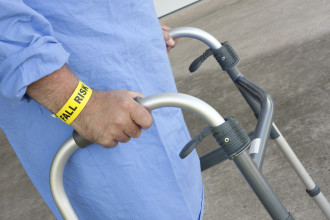State officials say they are able to respond immediately to reports of abuse or neglect in Georgia nursing homes, despite facing a large backlog of complaints.
The backlog of nursing home complaints coming from residents, families and others is roughly 140, the Department of Community Health says. That’s at or near a historic high, as complaints about nursing home care have risen 50 percent over the past two years, the agency said. (GHN previously reported on the backlog in this article.)
Frank Berry, new commissioner of Community Health, said complaints against nursing homes have risen nationally. “Across the country and across the state, there has been a big push for self-advocacy if you have a complaint,” he said.
One of the reasons why complaints are not all addressed promptly is the high job vacancy rate among the state’s nursing home surveyor workforce. There are 18 job slots currently unfilled, roughly a 40 percent vacancy rate.

Complaints now are being triaged, with the most serious ones getting attention first, Community Health says. “With abuse or neglect, we can intervene immediately,’’ Berry told GHN recently.
In addition to the backlog, regular nursing home inspections in Georgia are being delayed beyond what’s reflected under federal guidelines.
The Centers for Medicare and Medicaid Services says state agencies conduct on-site surveys of nursing homes every nine to 15 months, with a statewide average of every 12 months. But Georgia’s inspections are dragging past the 15-month mark, Berry acknowledged.

Berry said the state has spent an extra $1 million for outside firms to cover some of the investigative work that’s lagging.
And the agency is reviewing pay scales for surveyors “to make it a more attractive position,’’ Berry said. Currently the position pays about $50,000 annually, he said.
Kathy Floyd, executive director of the Georgia Council on Aging, told GHN on Thursday, “I think the [job] vacancies are the key because that leads to overburdening of the existing surveyors.’’
Tony Marshall, president and CEO of the Georgia Health Care Association, which represents nursing homes, said that “while we take comfort in the fact that the majority of complaints against skilled nursing care centers are not substantiated, we will continue to work collaboratively with the Department [of Community Health] to help solve backlog issues.”
Melanie McNeil, Georgia’s Long-Term Care Ombudsman, said that while the ombudsman program encourages residents and their advocates to work with nursing homes to resolve problems, “sometimes it takes the survey agency’s power to cite facilities for deficiencies to get problems corrected.”
“In addition, the survey process is critical to identify and correct problems in facilities before those problems become significant for residents,’’ she said. “When surveys are delayed, the opportunity to identify and correct problems is delayed.”

McNeil said Thursday that problems last year “put an unexpected strain’’ on Georgia nursing home residents, families, facilities, ombudsman representatives and surveyors.
One big problem, she said, was that five Georgia nursing homes were decertified – meaning that the government, due to quality concerns, would no longer pay for the care of Medicaid patients in those facilities. Those situations required more attention from surveyors and ombudsman representatives, McNeil said.
Some residents of the decertified nursing homes had to be relocated to other facilities, and the state needed additional staffers to monitor conditions and address concerns during that process, she said.
“Residents, families and facilities have added needs and concerns during times of relocations, so that may have added to the backlog of complaints,” McNeil added.

